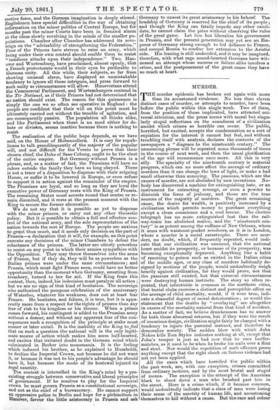KURDFX. T HE murder epidemic has broken out again with more
than its accustomed virulence. No less than eleven distinct cases of murder, or attempts to murder, have been before the public within this single week. Two of them, from the position of those implicated, have attracted uni- versal attention, and the press teems with moral but singu- larly stupid reflections on the soundness of a civilization amidst which crimes so horrible can occur. The public, horrified, but excited, accepts the condemnation as a sort of expiation for the interest it cannot but feel, and without troubling itself with analysis, declares the contents of the newspapers a "disgrace to the nineteenth century." The unmeaning phrase will be repeated some thousands of times in the course of next week, and then the usual glorification of the age will recommence once more. All this is very silly. The specialty of the nineteenth century is material progress, which can no more affect the average of ordinary murders than it can change the laws of light, or make a bad smell otherwise than annoying. The passions, which are the causes of murder, are not abolished by new inventions. No- body has discovered a machine for extinguishing hate, or an instrument for extracting revenge, or even a powder to diminish the force of jealousy, and those are the true sources of the majority of murders. The great remaining cause, the desire for wealth, is positively increased by a civilization which permits money to purchase everything except a clean conscience and a cool breeze. The electric telegraph has no more extinguished lust than the rail- way-train: has abolished malice, and the "nineteenth cen- tury" is as potent among the ruffians of New Orleans, whom it arms with waistcoat-pocket revolvers, as it is in London, where a murder is a social catastrophe. There are mur- ders, no doubt, which, if frequently repeated, would indi- cate' that our civilization was unsound, that the national heart amidst its prosperity, or because of its prosperity, was becoming exceptionally depraved. Anything like a habit of resorting to poison such as existed in the Italian cities of the middle ages, or any class of murders habitually de- signed by sections of the people, would undoubtedly weigh heavily against civilization, for they would prove, not that the passions still existed, but that external circumstances were destroying human instincts. The story so often re- pented, that infanticide is common in the northern cities, that burial clubs exercise a distinct and perceptible effect on the average of child mortality, would, if it were true, indi- cate a shameful degree of moral deterioration ; so would the statement that the deaths by "overlaying" are altogether in excess of the mortality natural from that kind of accident. As a matter of fact, we believe drunkenness has to answer for both these abnormal returns, but if they were the result of conscious design, civilization might fairly be charged with a tendency to injure the parental instinct, and therefore to demoralize society. The sudden blow with which John Nokes kills Tom Styles indicates nothing at all, except that John's temper is just as bad now that he uses Iucifer- matches, as it used to be when he broke his nails over a flint and steel. Nor would the repetition of such offences prove anything except that the right check on furious violence had not yet been applied. All the cases which have horrified the public within the past week, are, with one exception, crimes committed from ordinary motives, and by the most brutal and stupid of means. The exception is the attempt of the American black to shoot down a man who brushed past him in the street. Here is a crime which, if it became common, would undoubtedly indicate that a class of men were losing their sense of the sanctity of human life, and accustoming themselves to kill without a cause. But the race and colour of this man, and some other circumstances, make this ease entirely exceptional. Let us take the two cases which have excited the greatest amount of attention. Julius de Vidil, glove-maker, attache, and baron, is accused of having at- tempted the life of his son, Alfred de Vidil. There is a mys- tery about the transaction still, but suppose the charge true, it would be but an ordinary assassinationfromthe hope of gain. How is civilization to stop that ? It is not even an "alarm- ing" case, for the deed was attempted in the most public way, and by means any ploughboy is competent to devise. It is the scientific murder like Palmer's, the form of assassination which involves a high chance of impunity, which ought to alarm society, and not a mere brutal assault. All the civili- zation conceivable will not diminish the power of any man who chooses to bit down any other with a riding-whip. All it can do is to make it a certainty that the result will be more painful to himself than to his victim. So, too, in the matter of the tragedy in the Strand. That a man in decent position should decoy a -man of a better position into his room, and then, without motive, shoot the total stranger through the neck, would undoubtedly be a horrifying inci- dent. It would indicate that no amount of organization availed to protect the innocent from the guilty, and might even reflect, by a strained analysis, discredit on the civiliza- tion which could produce no better result. But that two men, mad with jealousy, should quarrel for some letters, pro- ceed to blows, and then to a death-grapple, that surely is not an incident condemning the nineteenth century, and that is quite as probable a version of the story as the current one. The event has no meaning whatever, except that jealousy and temper are passions as strong as ever they were. The Kings- wood murder, again, was in its origin a burglary, committed by a foreigner to get money, and only terminating in death because he was resisted or recognized. There is not a trace of intellect or precaution in the whole transaction, nothing to prove that the murderer was not a most ordinary brute. In the triple murder at Epworth the criminal is only a lunatic whose lunacy was unfortunately not sufficiently de- veloped for restraint. The suspected murder in Cambridge may be anything, but looks, on the face of the evidence, more like the result of a country quarrel than anything more premeditated. The remaining cases we need not go through : they are mere assaults by men and women accus- tomed to violence, of no more interest to society than the street quarrels which do not happen to terminate fatally.
The real lesson to be learnt from these occurrences is not to be taught by vain rhetoric about the hollowness of a civi- lization which has no influence in the matter. They furnish an additional illustration of the often-repeated argument, that our laws fail altogether to repress brutality. They are; indeed, absurdly lenient. There is a keen horror of murder among Englishmen, but there is a great tolerance for the brutality which so often ends in the hated crime. If a man kills his neighbour he is hung, but if he beats him black and blue, smashes his skull with the tongs, and tries to gouge his eyes out, as was done this week, he is fined three pounds, or a month's imprisonment. If Major Murray and Mr. Roberts had only sent one another into hospital, each would have got off with a fine. M. Julius Vidil is accused of murder, and, if guilty, will doubtless be severely punished ; but a man who struck a woman as severely this week was only fined. Inten- tion, no doubt, must be considered; but half the murders com- mitted are not intended. They are the result of a sudden access of passion, the only check on which is the terror of consequences. If a brutal street assault were invariably punished by six months' imprisonment, we should hear less of the savage attacks on passengers and the police, which are far more disgraceful to civilization than infrequent and half- accidental murders. They prove just what the "Strand tragedy" does not, that in the midst of our civilization there is an entire class neither softened nor placed under needful discipline. There is a dangerous element in opinion, a half- conscious contempt for the man who is beaten, which leads directly to the encouragement of this form of crime. Ma- terial progress will not alter that element, but sound laws will; and it is to this end, and not to gossip about civiliza- tion, that attention should be directed. Terror is a bad in- strument of government, but there are some impulses, and the impulse to murder is one of them, which can be repressed only by another emotion acting BB quickly and powerfully as themselves. The only such emotion human beings have at their disposal is terror, and it is by an unswerving but just severity, and not by common-places about progress, that scenes like those of the past week are to be made less fre- quent; wholly suppressed they can never be until mankind has acquired that habit of self-restraint which is the source of true social order, and with which the triumphs of science have nothing whatever to do.































 Previous page
Previous page